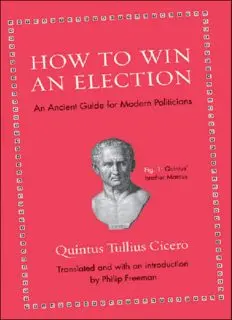
How to win an election : an ancient guide for modern politicians PDF
Preview How to win an election : an ancient guide for modern politicians
How to win an ElEction Cicero-Election.indb 1 11/17/2011 11:31:49 AM Cicero-Election.indb 2 11/17/2011 11:31:49 AM How to win an ElEction an ancient Guide for Modern Politicians Quintus tullius cicero Translated and with an introduction by Philip Freeman PrincEton UnivErsity PrEss PrincEton and oxford Cicero-Election.indb 3 11/17/2011 11:31:49 AM copyright © 2012 by Philip Freeman Requests for permission to reproduce material from this work should be sent to Permissions, Princeton University Press Published by Princeton University Press, 41 william Street, Princeton, new Jersey 08540 in the United Kingdom: Princeton University Press, 6 oxford Street, woodstock, oxfordshire oX20 1tw press.princeton.edu all Rights Reserved library of congress cataloging-in-Publication Data cicero, Quintus tullius. [commentariolum petitionis. English] How to win an election : an ancient guide for modern politicians / Quintus tullius cicero ; translated and with an introduction by Philip Freeman p. cm. includes bibliographical references and index. iSBn 978-0-691-15408-4 (hardcover : acid-free paper) i. Freeman, Philip, 1961- ii. title. Pa6371.c4a24 2011 324.7’20937—dc23 2011034838 British library cataloging- in- Publication Data is available this book has been composed in Garamond and Futura Printed on acid- free paper. ∞ Printed in the United States of america 1 3 5 7 9 10 8 6 4 2 Cicero-Election.indb 4 11/17/2011 11:31:49 AM contEnts Introduction vii A Note on the Translation xxiii How to win an Election 1 The Results of the Election 87 Glossary 89 Further Reading 97 Cicero-Election.indb 5 11/17/2011 11:31:49 AM Cicero-Election.indb 6 11/17/2011 11:31:49 AM introdUction in the summer of 64 bc, Marcus tullius cicero, the greatest orator ancient Rome ever produced, was running for consul, the highest office in the Roman Republic. He was forty-t wo years old, the son of a wealthy businessman from the small town of arpinum south of Rome. His father had seen that Marcus and his younger brother Quintus received the finest education and had even sent the boys to Greece to study with the most noted philosophers and ora- tors of the day. Marcus was a gifted speaker and pos- sessed a brilliant mind equal to his golden tongue. what he lacked was the advantage vii Cicero-Election.indb 7 11/17/2011 11:31:49 AM intRoDUction of noble birth. ancient Roman society was highly class- conscious and dismissed men such as Marcus cicero as unfit to preside over the republic. He was determined to prove them wrong. as a young man Marcus had completed an undistinguished year in military service under the father of the future Roman gen- eral Pompey the Great, who would one day defend the state against Julius caesar. this younger Pompey became a patron of Marcus and helped him in his subsequent political career. at twenty- five, Marcus won his first case in the Roman courts defending a well- connected man against murder charges. His reputation grew in the years to follow as he successfully represented many prominent men— victories that also helped him rise through the political ranks of the republic. He had already served admirably in the viii Cicero-Election.indb 8 11/17/2011 11:31:50 AM intRoDUction important but lesser offices of quaestor and praetor. However, no man outside the noble families had been elected as a consul for thirty years, making the attainment of this ultimate goal by Marcus unlikely. Yet in 64, the other candidates for the consulship—m ost notably antonius (known as Hybrida) and catiline— were such an unsavory lot that some of the nobility held their noses and threw their support behind Marcus cicero. Still, the thought of an outsider from a small town being one of the two consuls to govern the ancient republic, ruler of millions across the Mediterranean lands, was too much for many of the blue- blooded families to stom- ach. Marcus was going to have a long and difficult campaign if he was going to win. at this point the more practical Quin- tus decided that his elder brother needed ix Cicero-Election.indb 9 11/17/2011 11:31:50 AM
